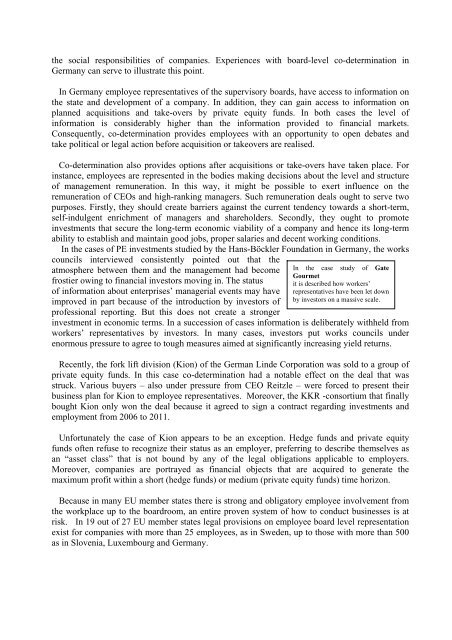Executive summary - Udo Bullmann
Executive summary - Udo Bullmann
Executive summary - Udo Bullmann
- No tags were found...
You also want an ePaper? Increase the reach of your titles
YUMPU automatically turns print PDFs into web optimized ePapers that Google loves.
the social responsibilities of companies. Experiences with board-level co-determination inGermany can serve to illustrate this point.In Germany employee representatives of the supervisory boards, have access to information onthe state and development of a company. In addition, they can gain access to information onplanned acquisitions and take-overs by private equity funds. In both cases the level ofinformation is considerably higher than the information provided to financial markets.Consequently, co-determination provides employees with an opportunity to open debates andtake political or legal action before acquisition or takeovers are realised.Co-determination also provides options after acquisitions or take-overs have taken place. Forinstance, employees are represented in the bodies making decisions about the level and structureof management remuneration. In this way, it might be possible to exert influence on theremuneration of CEOs and high-ranking managers. Such remuneration deals ought to serve twopurposes. Firstly, they should create barriers against the current tendency towards a short-term,self-indulgent enrichment of managers and shareholders. Secondly, they ought to promoteinvestments that secure the long-term economic viability of a company and hence its long-termability to establish and maintain good jobs, proper salaries and decent working conditions.In the cases of PE investments studied by the Hans-Böckler Foundation in Germany, the workscouncils interviewed consistently pointed out that theatmosphere between them and the management had becomeIn the case study of GateGourmetfrostier owing to financial investors moving in. The status it is described how workers’of information about enterprises’ managerial events may have representatives have been let downimproved in part because of the introduction by investors of by investors on a massive scale.professional reporting. But this does not create a strongerinvestment in economic terms. In a succession of cases information is deliberately withheld fromworkers’ representatives by investors. In many cases, investors put works councils underenormous pressure to agree to tough measures aimed at significantly increasing yield returns.Recently, the fork lift division (Kion) of the German Linde Corporation was sold to a group ofprivate equity funds. In this case co-determination had a notable effect on the deal that wasstruck. Various buyers – also under pressure from CEO Reitzle – were forced to present theirbusiness plan for Kion to employee representatives. Moreover, the KKR -consortium that finallybought Kion only won the deal because it agreed to sign a contract regarding investments andemployment from 2006 to 2011.Unfortunately the case of Kion appears to be an exception. Hedge funds and private equityfunds often refuse to recognize their status as an employer, preferring to describe themselves asan “asset class” that is not bound by any of the legal obligations applicable to employers.Moreover, companies are portrayed as financial objects that are acquired to generate themaximum profit within a short (hedge funds) or medium (private equity funds) time horizon.Because in many EU member states there is strong and obligatory employee involvement fromthe workplace up to the boardroom, an entire proven system of how to conduct businesses is atrisk. In 19 out of 27 EU member states legal provisions on employee board level representationexist for companies with more than 25 employees, as in Sweden, up to those with more than 500as in Slovenia, Luxembourg and Germany.





